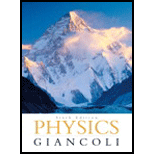
Concept explainers
Since the density of air decreases with an increase in temperature, but the bulk modulus Bis nearly independent of temperature, how would you expect the speed of sound waves in air to vary with temperature?
How the speed of sound waves in air to varies with temperature.
Answer to Problem 11Q
Solution:
The speed of sound waves in air increase with increasing temperature.
Explanation of Solution
The speed of sound waves in air should increase with increasing temperature. Speed of sound waves is inversely proportional to the square root of density. By increasing the temperature, the density of air decreases, which will lead to a larger range between the bulk modulus and density, leading to higher speed of sound.
Conclusion:
It is very important to understand the concepts in order to give a correct answer.
Chapter 11 Solutions
Physics: Principles with Applications
Additional Science Textbook Solutions
Physics for Scientists and Engineers: A Strategic Approach, Vol. 1 (Chs 1-21) (4th Edition)
Microbiology: An Introduction
Microbiology: An Introduction
Genetic Analysis: An Integrated Approach (3rd Edition)
Microbiology with Diseases by Body System (5th Edition)
Chemistry: A Molecular Approach (4th Edition)
- Example Two charges, one with +10 μC of charge, and another with - 7.0 μC of charge are placed in line with each other and held at a fixed distance of 0.45 m. Where can you put a 3rd charge of +5 μC, so that the net force on the 3rd charge is zero?arrow_forward* Coulomb's Law Example Three charges are positioned as seen below. Charge 1 is +2.0 μC and charge 2 is +8.0μC, and charge 3 is - 6.0MC. What is the magnitude and the direction of the force on charge 2 due to charges 1 and 3? 93 kq92 F == 2 r13 = 0.090m 91 r12 = 0.12m 92 Coulomb's Constant: k = 8.99x10+9 Nm²/C² ✓arrow_forwardMake sure to draw a Free Body Diagram as wellarrow_forward
 College PhysicsPhysicsISBN:9781305952300Author:Raymond A. Serway, Chris VuillePublisher:Cengage Learning
College PhysicsPhysicsISBN:9781305952300Author:Raymond A. Serway, Chris VuillePublisher:Cengage Learning University Physics (14th Edition)PhysicsISBN:9780133969290Author:Hugh D. Young, Roger A. FreedmanPublisher:PEARSON
University Physics (14th Edition)PhysicsISBN:9780133969290Author:Hugh D. Young, Roger A. FreedmanPublisher:PEARSON Introduction To Quantum MechanicsPhysicsISBN:9781107189638Author:Griffiths, David J., Schroeter, Darrell F.Publisher:Cambridge University Press
Introduction To Quantum MechanicsPhysicsISBN:9781107189638Author:Griffiths, David J., Schroeter, Darrell F.Publisher:Cambridge University Press Physics for Scientists and EngineersPhysicsISBN:9781337553278Author:Raymond A. Serway, John W. JewettPublisher:Cengage Learning
Physics for Scientists and EngineersPhysicsISBN:9781337553278Author:Raymond A. Serway, John W. JewettPublisher:Cengage Learning Lecture- Tutorials for Introductory AstronomyPhysicsISBN:9780321820464Author:Edward E. Prather, Tim P. Slater, Jeff P. Adams, Gina BrissendenPublisher:Addison-Wesley
Lecture- Tutorials for Introductory AstronomyPhysicsISBN:9780321820464Author:Edward E. Prather, Tim P. Slater, Jeff P. Adams, Gina BrissendenPublisher:Addison-Wesley College Physics: A Strategic Approach (4th Editio...PhysicsISBN:9780134609034Author:Randall D. Knight (Professor Emeritus), Brian Jones, Stuart FieldPublisher:PEARSON
College Physics: A Strategic Approach (4th Editio...PhysicsISBN:9780134609034Author:Randall D. Knight (Professor Emeritus), Brian Jones, Stuart FieldPublisher:PEARSON





